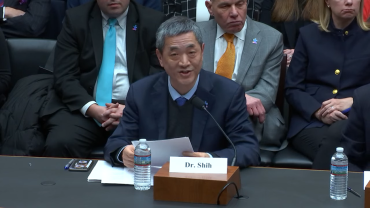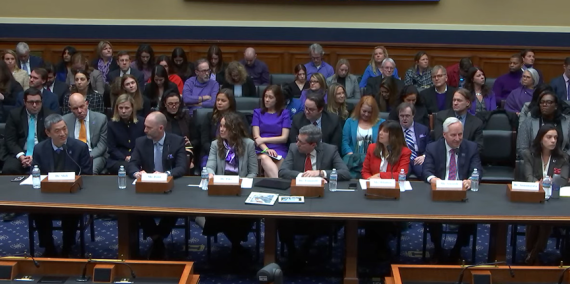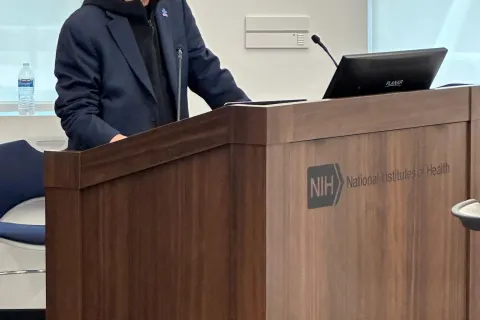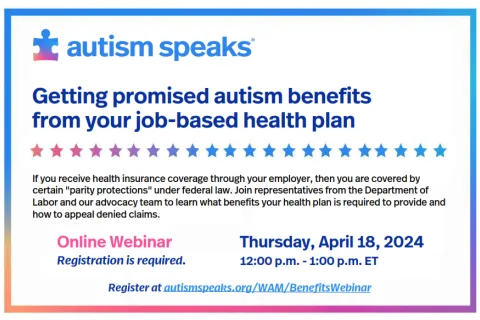Autism Speaks Chief Science Officer speaks at congressional hearing on the Autism CARES Act of 2024
February 15, 2024Yesterday, the House Energy and Commerce Committee’s Health Subcommittee held a hearing titled “Legislative Proposals to Support Patients and Caregivers.” The hearing considered 19 public health bills. Most notably for people with autism and their families, the committee heard about the transformative impact of programs authorized under the Autism CARES Act of 2024 and the bill’s potential to drive further improvements in care and services for the autism community.
Autism Speaks Chief Science Officer Andy Shih was one of seven individuals invited by the Health Subcommittee Chair Brett Guthrie and Ranking Member Anna Eshoo to testify before the committee. These witnesses provided expertise on the bills their respective organizations have endorsed and translated to Congress the importance of the legislative proposals in serving patients and caregiver communities.
The Autism CARES Act of 2024, recently introduced by Autism Caucus Co-Chairs Congressmen Chris Smith and Henry Cuellar, would authorize over $2 billion in funding over the next five years for programs primarily at the National Institutes of Health (NIH), the Centers for Disease Control and Prevention (CDC), and the Health Resources and Services Administration (HRSA) that advance autism research, services, and training of health care professionals. Its significance to the autism community cannot be overstated as it is the only piece of federal legislation solely dedicated to improving the lives of autistic people.
“The Autism CARES Act is a remarkable example of how bipartisan collaboration can propel progress.
Over the past two decades, the Autism CARES Act has fundamentally transformed our understanding of autism and reshaped the landscape of support for individuals on the spectrum. Here are just a few of the major ways the legislation impacts people across the country.
Our Understanding of Autism Prevalence
Since the first version of the Autism CARES Act was signed into law, we have seen a fundamental change in our understanding of autism and, most important, acceptance of autistic people. The foundation of that change comes from acknowledging that thirty years ago, autism was thought to be extraordinarily rare. Thanks to programs like the CDC’s ADDM Network, authorized by the Autism CARES Act, we know that 1 in 36 children and 1 in 45 adults are estimated to have autism in the United States. Congresswoman Diana Harshbarger highlighted why the information gathered through this program is significant in her Q&A with Andy Shih.
Research that informs clinical care and family resources
Research has led to countless advancements in our understanding of autism, from the biology of the condition to the medical complexities that affect autistic individuals at much higher rates. In large part due to the research that the Autism CARES Act has funded, through programs like the NIH Autism Centers of Excellence, we also have a much clearer picture of the significant disparities that autistic people experience in terms of access to quality health care, daily life supports and services, and employment opportunities.
The knowledge gained from research also then informs the development of best practices and solutions. Through support of clinical and community-focused programs, the Autism CARES Act ensures this knowledge reaches all families through improved services, personalized interventions, and toolkits for autism-specific challenges.
Training Healthcare Providers
The Autism CARES Act of 2024 authorizes funding for important training programs, which has led to 60 Leadership Education in Neurodevelopmental and Other Related Disabilities (LEND) sites around the country and 13 Developmental Behavioral Pediatric Training Programs that prepare future leaders and professionals to deliver high-quality care and services. These programs help increase awareness of autism, reduce barriers to screening and diagnosis, promote the use of evidence-based interventions, train professionals to use valid screening tools, and improve the overall quality of medical care received by autistic individuals.
Our Path Forward
It is because of the investments made as result of the Autism CARES Act that we are poised to take the next steps. The Autism CARES Act of 2024 offers the opportunity to enhance current federal efforts to better meet the needs of all those across the spectrum and lifespan. Just a few of the areas where more focus is needed includes, but is not limited to, our understanding of:
- the daily life challenges of autistic adults as well as autism and aging so that appropriate services and solutions can be developed to meet their growing needs;
- how to best support autistic people who are non-speaking or may need additional communication supports;
- how to best meet the health care and safety needs for autistic people who require 24-hour care and may struggle with harmful behaviors.
As this legislation moves forward, Congress also has an opportunity to help bridge the gap between what has been recommended for autism research investments and where we are by ensuring follow-through by agencies across the federal government. By building upon the current legislation, we can preserve the current efforts of existing Autism CARES Act initiatives while addressing the significant gaps that remain for too many autistic people. However, for the existing programs to continue, the law must be renewed by the end of September, when provisions of the current iteration of the law will sunset.
We are grateful for the committee’s review of the Autism CARES Act of 2024, and we look forward to working with the Committee and Congress as a whole as this process to reauthorize the law unfolds. We will continue to advocate that this strong foundation of federal investment in autism research is fortified and built upon to ensure these programs meet the current and future needs of autistic individuals and their families.
The full hearing can be viewed on the Energy & Commerce Committee’s YouTube Channel.
Read Andy Shih’s full testimony here.










